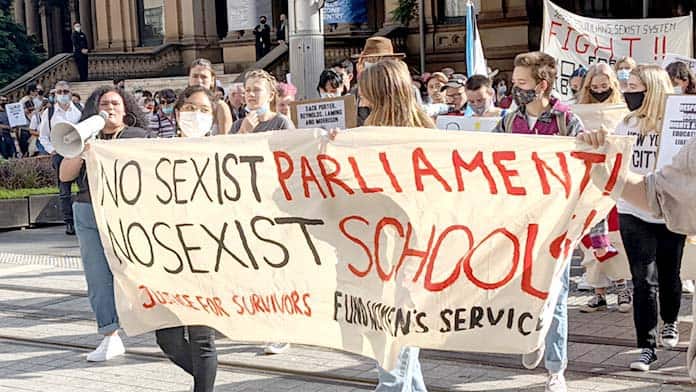When the #MeToo movement erupted in 2017, the rage was palpable. It gave women the confidence to share their stories of sexual assault and harassment, and finally they were being believed.
More than 200 powerful men were taken down by survivors’ testimonies and protesters took to their streets in their thousands for Women’s Marches demanding accountability from abusers.
In 2021, the rage was reignited in Australia with the revelations that Brittany Higgins was raped in Parliament House and Liberal minister Christian Porter was accused of a historic rape. The Morrison government’s contempt for women drew 150,000 protesters out for the March4Justice rallies.
Jess Hill’s Quarterly Essay The Reckoning is an assessment of the #MeToo movement in Australia. Hill’s essay details the downfall of a handful of powerful Australian men, dedicates a whole chapter to praising the Turnbull government and shares the powerful stories of women standing up to their abusers.
But Hill fails to understand or explain the origins of sexism and in doing so leaves the reader with little hope that things can be changed.
“Why is hatred and contempt for women still a default position for so many boys and men?” asks Hill.
Her answer is a “maleness” that is so traumatising it leaves men unable to be emotional, expressive or vulnerable.
But the problem is not maleness, but rather the experience of life in a capitalist society that is permeated with sexism.
All around us are sexist ideas and institutions that reflect women as merely sexual commodities, caregivers and homemakers. Because without women’s unpaid domestic labour and caregiving, the capitalist state would have to fund it—to the tune of $10.9 trillion.
Sexist ideas
Hill rightly points out that things such as pornography influence the perception of women’s worth. These sexist ideas are perpetuated by capitalist institutions—from the school system, to advertising, the media and the government.
Men aren’t innately sexist or prone to abusing women. They learn these ideas from the world around them. As Karl Marx once wrote, “The ruling ideas are the ideas of the ruling class.”
But the movement with the potential to challenge this and win serious reforms that could transform women’s lives is mentioned only once. “Unions work on these issues every day and continue to improve conditions for women in the workplace,” writes Hill.
Things like equal pay, permanent jobs, free childcare, abortion rights, funding for women’s services and adequate welfare payments give women the confidence and the financial freedom to do something about abuse and harassment—both in the home and in the workplace.
But under capitalism these things must be fought for, and at the height of the #MeToo movement, workers took the fight against sexism into their workplaces.
Workers at McDonalds, Google and at hotels in the US staged walk-outs and strikes and won their demands around sexual harassment at work.
And in 2019, workers at Chemist Warehouse distribution centres in Melbourne and Brisbane struck as part of a campaign against sexual harassment and bullying that won permanent jobs and pay rises, while forcing sexist managers to resign.
Despite these inspiring struggles against sexism, Hill’s answer for vulnerable working women experiencing harassment in the workplace is meagre stuff—the Respect@Work report and whoever forms government after 21 May.
Men
The final chapter, titled Men, takes a pessimistic outlook on the future of the women’s movement. “Do we, ultimately, believe it’s possible for them [men] to change?” asks Hill.
This kind of essentialism leaves little inspiration that things could ever change. But history shows us what is possible and the kinds of demands we need to transform women’s lives.
Over the course of the 1917 Russian revolution, abortion was legalised and made free, women were paid equally, prostitution was decriminalised, paid maternity leave was introduced and women were liberated from the home through socialised domestic labour provided by the state. This is the kind of world we should be fighting for.
Hill’s essay seeks to explain how #MeToo is changing Australia. It’s true that #MeToo has put powerful abusers on notice, that women’s rage and protest has forced some concessions from the government and that the movement has given women the confidence to finally share their stories.
But the essay is only useful as a catalogue of #MeToo in Australia. Instead of arguing for the radical transformation of society that could end sexism, Hill believes that in a century “women will still be holding signs … that say ‘I can’t believe we’re still protesting this shit’.”
By Ruby Wawn
“The Reckoning: How #MeToo is Changing Australia”, by Jess Hill, Quarterly Essay 84, $24.99






